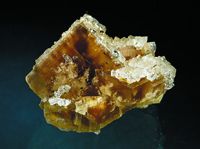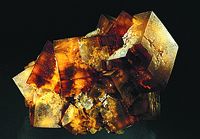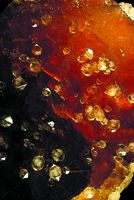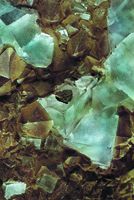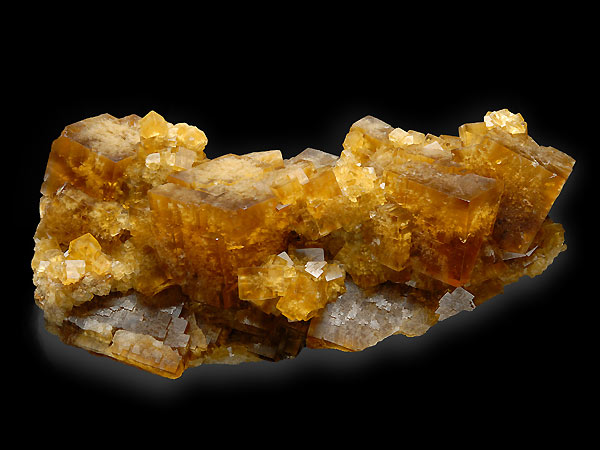
Need of a testimony
The history of the Valzergues fluorite mine is short. Yet, according to the mineralogic specimens produced, this mine is universally known by collectors. Althought this mine lasted only fifty years, it would be a pity to forget an exploitation where men, women and kids have devoted an important part of their life.
France, by its rich mineral heritage has huge fluorspar reserves ; they have been exploited in several ten of mines and certain of them remain activ, but for how long? As a matter of fact, they tend to disappear but, is it a reason to forget what was the life of many miners?
When we talk about this subject, a kind of censury appears. The mine owners are too much modest. They refuse to talk about it. They don't want to devote themselves to confidences. Information is jealousy kept. Allright, works were not always funny; they were sometime made in harsh conditions of artisanal exploitation. But, is it once again a reason to forget?
| Therefore, I realized it was necessary to bring written testimonies of human works... for respect of people who took part in it and for avoiding the fall of this small exploitation in the darkness. |
Otherwise, it seems inconceivable to have mineralogic specimens without being
interested in the life of the exploitation where they come from. Moreover,
minerals appear in collections only because of a work of exploration and we have
thus to look an eye on the work of prospectors having allowed this creation of
mines...
Few documents exist on this exploitation which was active during
fifty years. It is also difficult to reach these documents. Nevertheless, I want
to drive you to Valzergues in order to share with you the joy of penetrating in
this underground world. You can feel this particular moisture. You can move in
the silence of the galleries with your only friend: the gleam of your lamp. The
silence is disturbed by some water drops falling. They will be lost in the ground
in order to take part in the elaboration of new ore veins which we will never
be able to see...
The book " The Valzergues Fluorite Mine"
(La Mine de Fluorine de Valzergues) perennializes the human memory. Future
generations will know the experience and the human heat felt by the minors must
not be definitely be hidden behind the cold words "industrial archeology".
The MINE…
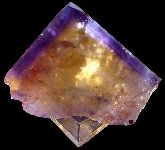 | Discovered in 1923 by Victor Lassale, the Valzergues fluorite mine has been exploited during the growing period of steel and aluminium industry. Numerous societies succeeded one another (cf summary). Its history has been strictly linked to the economic situations, and consequently, it's at the beginning of the decade 70s, it stopped to exist as an exploitable deposit. |
Its history was also related to characters of the mine. As a matter of fact, these
people had no power on the complex relations between exploitation cost, geological
factors controlling the geometry of the vein, grade and extracted tonnage. Consequentlly,
the mine knew activity and no-activity periods. But more than two decades ago,
a small-owner was careful and continued more rigourously investigations in order
to know the real capacities of the site.
As in the very small mines, French fluorite extraction was becomming more expensive than importation from other countries, this mine has been definiitely abandoned. Consequently, the exploitation has been forgotten... However, mineralogists didn' forget it. The Yellow vein knew more and more investigations. It delivered remarkable mineralogical specimens which contributed this mine to get universally famous. Cubes of yellow fluorite, with or without blue colouring zone were quickly found in large collections.
The mine has continued to be explored and hasdelivered some of its secrets. This mine represents a part of History (not only local, because this type of ore and this type of mine is a model for thousands of other fluorspar deposits both in France and other countries). It also represents the testimony of the work of men, women and children. Currently, it doesn't seem important to preserve this geological heritage. Thus, the old underground workings have been put in safety.
| Valzergues
diserevd to be irremediatly closed. Indeed, in 2001, the disgraceful behavior
of a mineralogists club resulted in the closure of the mine by the last owner.
Later, indiscreet people had not the delicacy to respect this decision. Unfortunately,
they opened the addits in a glaring way. Currently (07/2003), the owner has closed
the site again by using this time a huge plug of cement... Discretion and
respect don't seem a part of education of some of the collectors which is a problem
between those who work securely and respect the sites, and the others. |
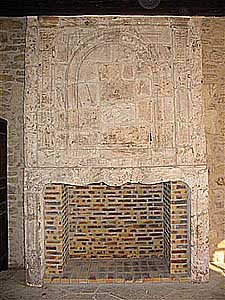 |
For people appreciating heritageand "old stones", they should know that the chimney piece of the Valzergues towhall was built with barite of Montpestels. This exploitation is close to the Valzergues fluorite mine. Its history is closely linked to Valzergues mine history (see book).
Photo : J. Dintilhac © 2005 |
